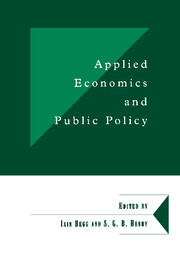Book contents
- Frontmatter
- Contents
- List of figures
- List of tables
- List of contributors
- Foreword
- 1 Introduction
- Part One MODELLING AND FORECASTING METHODS
- Part Two COMBINING DATA AND ANALYTIC TECHNIQUES
- Part Three USING MODELS TO GUIDE POLICY
- 10 On the equilibrium properties of macroeconomic models
- 11 Empirical analysis as an underpinning to policy
- 12 Using figures to guide macroeconomic policy
- Bibliography
- Index
11 - Empirical analysis as an underpinning to policy
from Part Three - USING MODELS TO GUIDE POLICY
Published online by Cambridge University Press: 06 July 2010
- Frontmatter
- Contents
- List of figures
- List of tables
- List of contributors
- Foreword
- 1 Introduction
- Part One MODELLING AND FORECASTING METHODS
- Part Two COMBINING DATA AND ANALYTIC TECHNIQUES
- Part Three USING MODELS TO GUIDE POLICY
- 10 On the equilibrium properties of macroeconomic models
- 11 Empirical analysis as an underpinning to policy
- 12 Using figures to guide macroeconomic policy
- Bibliography
- Index
Summary
Introduction
Whether by accident or design, I have worked practically all of my professional life at or around, as the lawyers say, the interface between economic analysis and economic policy-making. Life at an interface tends to be turbulent, with a propensity to throw up the sorts of events which are not easy to explain. Nor does it sufficiently often provide the time to draw breath and reflect, so I am grateful to Iain Begg not only for giving me the opportunity to write this paper, but also for imbuing me with a certain sense of obligation. For as E. M. Forster, I understand it was, observed, how can I know what I think until I see what I write?
The structure of the paper is something of an Odyssey; but that is how my experience of this subject came to me, and I can see no better way to set it down.
Theory or applied?
Some months after I joined the Department of Applied Economics, in 1970, I had the opportunity to ask the august Joan Robinson what was to me, a young man newly arrived from doing an applied economics DPhil at Oxford, a particularly important, if personal, question. The opportunity arose because, late for the next train to London, she had graciously accepted my offer to drive her to Cambridge station.
- Type
- Chapter
- Information
- Applied Economics and Public Policy , pp. 247 - 257Publisher: Cambridge University PressPrint publication year: 1998
- 2
- Cited by



